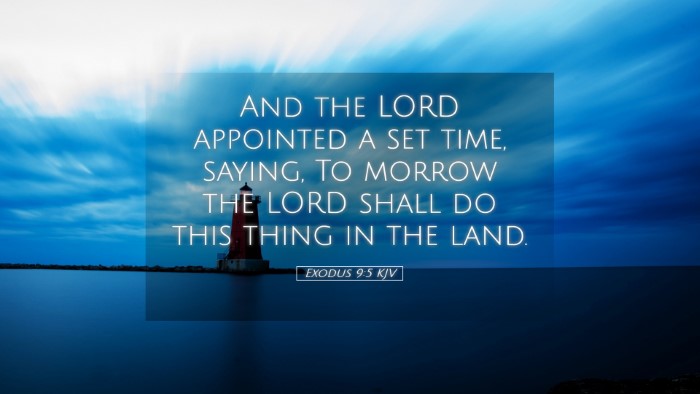Exodus 9:5 Commentary
Verse: "And the Lord appointed a set time, saying, To morrow the Lord shall do this thing in the land."
Introduction
This verse occurs in the context of the fifth plague that God sent upon Egypt, specifically the plague of the livestock. The significance of temporal markers, divine authority, and the unfolding of God's redemptive plan is deeply rooted in these words. Understanding this verse helps in grasping God's sovereignty and judgment against idolatry, and His protection over Israel.
God's Sovereign Authority
Matthew Henry: Henry emphasizes that God's declaration of a "set time" showcases His sovereignty over time and events. It illustrates that God is not arbitrary but precise in His dealings with humanity, knowing the exact moment when His will shall unfold. This momentary specification acts to magnify God's power and incite fear in the Egyptians, who had placed their faith in false deities.
Albert Barnes: Barnes highlights the phrase “a set time” as an affirmation of God’s control over history and events. He argues that this statement calls attention to God’s justice and mercy in executing judgment. It serves as a reminder that God’s plans are steadfast and cannot be altered by human actions or beliefs.
Adam Clarke: Clarke notes that the mention of a specific time adds gravitas to God’s promise of action. It enhances the sense of anticipation and serves to demonstrate the futility of turning to other gods for deliverance when salvation comes solely from Yahweh.
The Role of Expectation
The explicit timing mentioned in this verse suggests an expectation that the people of Egypt must prepare for the impending consequence of their sins. This relates closely to the biblical theme of anticipation for God's intervention, which draws the reader's mind to the broader narrative of redemption throughout scripture.
Matthew Henry: He comments that the proclamation of a specific day serves to prepare both the Israelites and Egyptians for the coming judgment, heightening the sense of divine assurance for the Israelites while instilling dread in their oppressors.
Albert Barnes: Barnes suggests that timing is a crucial element in God's redemptive plan. The anticipation of judgment can lead to repentance or deeper rebellion, depending on one’s heart posture toward God’s authority. This duality is essential for pastoral care and understanding the heart of ministry.
Prophetic Significance
Henry asserts that this prophetic announcement reflects God’s nature as a promise-keeper. The clarity of His intentions provides not just a warning but a foreshadowing of His ultimate plan for Israel’s deliverance.
Adam Clarke: Clarke refers to the significance of such prophetic utterances throughout scripture. They not only serve the immediate context but also echo throughout history. The anticipation of divine judgment finds its parallel in Christ’s second coming, elevating this passage to a prophetic alert across the ages.
The Implications of Divine Judgment
The implications of God’s judgment permeate through time. There exists a need to understand how God's actions correlate with human sinfulness and His desire for repentance.
Matthew Henry: Henry maintains that judgments, as seen in this verse, are often a means of drawing people back to God. The severity of the plague not only acted against the Egyptians’ livestock but also served to demonstrate God’s supremacy over their idolatrous worship.
Albert Barnes: Barnes warns of the dire consequences of ignoring the calls to repentance that God sets forth. He posits that this moment in history serves as a reflection of God's patience juxtaposed with His determination to uphold His righteousness.
Conclusion
Exodus 9:5 encapsulates the themes of divine sovereignty, timely intervention, and judicial proclamation that resonate within the broader Mosaic narrative. These commentaries breathe depth into our understanding of this pivotal moment as both historical event and theological teaching.
This verse invites pastors, theologians, and students to reflect on the ways God prepares humanity for His actions, the importance of expectation in waiting for His deliverance, and the ultimate call towards repentance. It challenges the reader to consider the implications of God's judgments and how an awareness of divine timing shapes our faith responses today.


